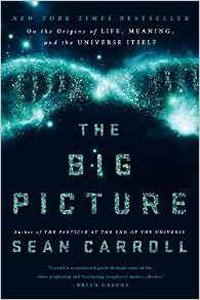 Carroll, Sean. 2016. The Big Picture: On the Origins of Life, Meaning, and the Universe Itself. Dutton. *****
Carroll, Sean. 2016. The Big Picture: On the Origins of Life, Meaning, and the Universe Itself. Dutton. *****
CalTech physicist Carroll describes the perspective we gain from cosmology and science in how we view our world and our place in it: how that understanding is purely materialistic and non-supernatural, and how that’s OK. Carroll avoids the perils of reductionism through the idea of “poetic naturalism” and the notion that we use different kinds of ‘stories’ to describe the world at different levels of complexity or levels of emergence. He discusses how current understanding of physics rules out psychic powers (and life after death), and discusses evolution and the evident lack of ‘purpose’, why we can dismiss various arguments for a god, different ways of thinking [again, Kahneman], morality and meaning of life. He concludes with a list of “Ten Considerations” (rather than Commandments), things to keep in mind while deciding how we want to live. My post includes links to summaries of the book’s six sections on the author’s website, and my own summary and comments on his “Ten Consideration.” (post)
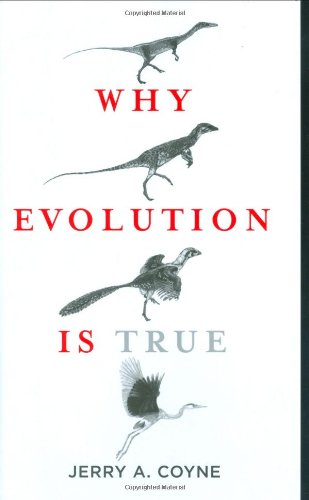 Coyne, Jerry A.. 2009. Why Evolution is True. Viking. *****
Coyne, Jerry A.. 2009. Why Evolution is True. Viking. *****
Coyne outlines the multivarious lines of evidence for the fact of evolution, in the context of the continual social battles and resistance to the idea, especially in the US. He discusses the modern theory of evolution and its six components, including the fact of biological evolution (through all the evidence), the idea of natural selection, and so on, the kinds of predictions it can make as a theory, and how growing evidence over 150 years has repeatedly confirmed those predictions. The lines evidence boil down to 1) the evidence of the fossil record; 2) the evidence of vestiges and atavisms in current biological features that were once useful but are now useless or even harmful; 3) how the distribution of species around the world, on different islands and continents, reflects geological changes over millions of years; 4) how the appearance of “design” is explained by natural selection, an idea that still shocks people; 5) how sex drives evolution, the differing mating strategies of the two sexes prioritizing different kinds of health; 6) how species — populations that don’t interbreed with other groups — arise via reproductive barriers, e.g. separated by mountain ranges, continental drift, etc.; analogous to how languages evolve; and 7) How evidence for human evolution, once only a speculation by Darwin, has been elaborated and compounded. And finally he addresses how evolution entails notions of purpose, morality, and meaning, thus alarming conservatives; but genes aren’t destiny, and we make our own purposes through work, family, avocation, contemplating the universe. (post)
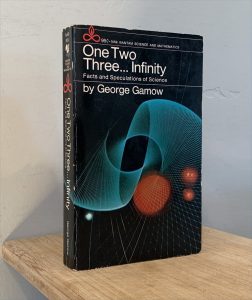 Gamow, George. 1961. One, Two, Three…Infinity. Bantam. *****
Gamow, George. 1961. One, Two, Three…Infinity. Bantam. *****
First published 70 years ago, this is dated now of course, lacking 70 years of advancements in all the sciences since it was first published. But in its time this was one of the best popular science books ever written, covering the basics of numbers, space and time, chemistry and biology, astronomy and cosmology. Personally, when I read this at age 14, I was especially impressed by the sections about infinities, and the history of how humans, step by step, discovered the size and shape of the Earth, the solar system, the stars, the galaxies. My copy shown here is the 1967 Bantam edition. (post) (Read Reread Jan-Aug 2022)
 Grayling, A. C.. 2013. The God Argument: The Case Against Religion and for Humanism. Bloomsbury. *****
Grayling, A. C.. 2013. The God Argument: The Case Against Religion and for Humanism. Bloomsbury. *****
British philosopher Grayling’s book is a worthy, graceful companion to the relatively incendiary books of the 2000s by “new atheists” Harris, Dawkins, and Hitchens. He provides a reasoned discussion of the pitfalls of the religion and a defense of the life-enhancing alternative, that of humanism. He dismisses the defenses of religious apologists, and defends humanism as based on the best, most generous, most sympathetic understanding of human reality: How faith is held despite evidence, or despite the faith of those with different faiths, just as we dismiss the myths of the Greeks and Babylonians. The classic arguments for God might as well prove Zeus, as the Christian God. The portion of humanity that is not Christian are not, in fact immoral; they do not depend on the Bible and its commandments to understand what is right or wrong. The second half of the book focuses on the positive: the case for humanism. Religion, based on “superstitions of illiterate herdsmen living several thousands of years ago,” deserves no privileged place in society. Humanism is the ethical outlook that says each individual is responsible for choosing his or her own values and goals, and is responsible for living considerately of others. Grayling describes 10 criteria for living a good life, and says the meaning of life is what you make it: loving someone, raising children, succeeding in one’s field; having integrity, being honest. How morality is an objective matter, about our fellow humans, without reference to any deity. If I were to recommend one book to believers who have doubts, or to believers who simply want to understand why nonbelievers cannot accept what believers feel to be the obvious truth of their faith, it would be this one.[Quote of first paragraph: “To put matters at their simplest…”; full discussion]
 Greene, Brian. 2020. Until the End of Time: Mind, Matter, and Our Search for Meaning in an Evolving Universe. Knopf. *****
Greene, Brian. 2020. Until the End of Time: Mind, Matter, and Our Search for Meaning in an Evolving Universe. Knopf. *****
A big picture book about the history of the cosmos, and humanity, with much familiar material but also two key themes of Greene’s own: the idea of nested stories to understand reality at various scales, and his idea of what kind of meaning we can deduce from our existence and the future of the universe. Early chapters concern entropy and evolution, and especially what the former actually means. Complexity including life, apparently contradicting the second law of thermodynamics, is possible because of what Greene calls the “entropic two-step,” essentially meaning the local complexity here will eventually drain back in the environment later. Then: the history since the big bang, “inflation” as the rare but inevitable consequence of repulsive gravity, the formation of the elements and of structures resulting in life. Darwinism at the molecular level. Life led to consciousness and the mind, and then to imagination, in particular to stories and why they are useful. Stories became religions with survival values and notions of the sacred. How beliefs arise, evolving to promote survival, not to understand reality. The roles of art in human society; artistic truth tells a higher-level story. The author fulfills the promise of the title by projecting the deep future: the fate of the sun and earth, black holes that sweep the galaxies clean. Thought might survive even the existence of matter, if it slows way down. Then the end of time and the disintegration of emptiness. Finally, meaning: There is no grand design or purpose; we exist while an infinite number of other possible people do not. Beyond that, perhaps our brains are not structured to answer the deep questions. We construct our own meaning. Perhaps, in the end, it is only story. (post 1; post 2; post 3; post 4; post 5) (Read Jul 2024)
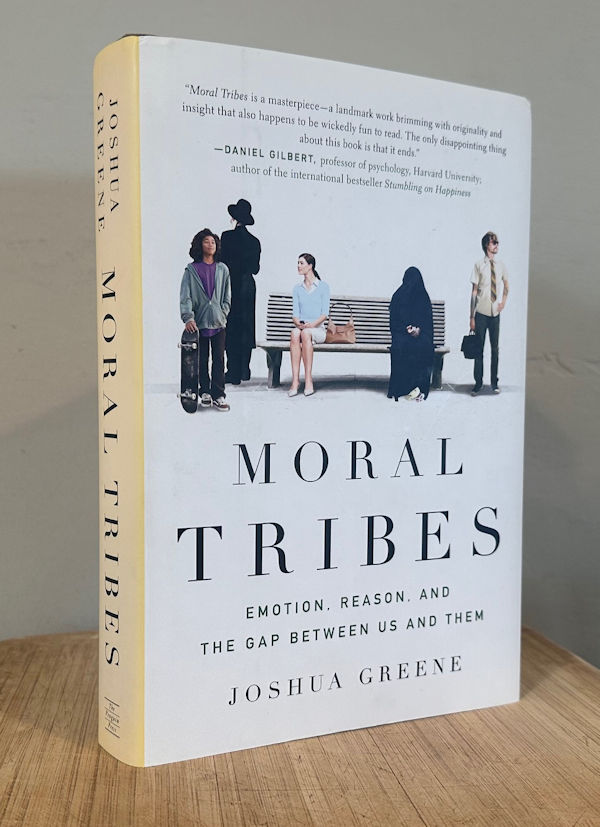 Greene, Joshua. 2013. Moral Tribes: Emotion, Reason, and the Gap Between Us and Them. Penguin. *****
Greene, Joshua. 2013. Moral Tribes: Emotion, Reason, and the Gap Between Us and Them. Penguin. *****
Keying off Garrett Hardin’s “tragedy of the commons,” the author explores the “tragedy of commonsense morality” to show the effects of different moral policies for sharing resources and dealing with conflicts. How did cooperation evolve at all, given Darwinian competition? Morality evolved to enable it, via altruism and unselfishness, as humans formed groups (tribes). But now humanity is in need for a “meta-morality” to avoid conflicts and solve problems among all tribes. Greene summarizes the roots of morality via the Prisoner’s Dilemma, tit for tat, Hobbes’ Leviathan, the trolley problem, etc. The solutions of this morality don’t always work in the modern world. His solution is a modified utilitarianism that he calls “deep pragmatism,” and shows how this approach can be applied, for example, to the abortion dispute. Finally, Greene defends liberalism and explains why he thinks liberal policites make the world happier. He quibbles a bit with implications of Haidt’s Moral Foundations Theory and claims that liberals’ moral tastes are more refined than those of conservatives; the latter have yet to outgrow the tribal morality that is unsuitable to the modern world. Thus liberal nations exhibit the highest levels of quality of life and happiness in the world. And he ends with six rules for modern “herders,” beginning with not trusting your moral instincts — “don’t believe everything you think” — how rights are invoked to end arguments when you have no evidence, how to focus on facts, be aware of our own biases, use common currency (e.g. science) for establishing facts, and giving. A big substantial book that ties together ideas about morality, evolution of the mind, politics, and psychological biases from many other writers (Pinker, Wilson, Haidt, Kahneman, and later reflected by Wallace and Gregg). A second post follows the link here. (post) (Read Apr 2024)
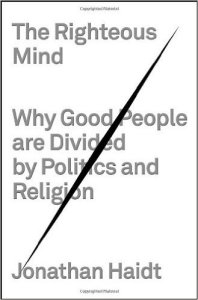 Haidt, Jonathan. 2012. The Righteous Mind. Pantheon. *****
Haidt, Jonathan. 2012. The Righteous Mind. Pantheon. *****
Social psychologist Haidt uses studies into moral sentiments around the world to develop ideas about the ‘foundations’ of morality, especially to expand the standard ‘liberal’ ideal that focuses on egalitarianism, with the idea that morality is all about care vs. harm, fairness vs. cheating, liberty vs. oppression. These are Western, educated values; in contrast, in other parts of the world, other sentiments are just as important: loyalty vs. betrayal, authority vs. subversion, sanctity vs. degradation. In Western countries, those sensitive to all six are conservative; those sensitive mostly to egalitarianism, fairness, and liberty are liberals. He considers these foundations in terms of evolutionary psychology and group selection, and examines various political issues in their light. Intuition and reasoning are both kinds of cognition [cf. Kahneman], and Haidt explores why our minds evolved this way; discusses group selection, why it went out of fashion, how its problems were solved by the earliest evolution of religion. Religion is about belonging to a group with shared beliefs, and it evolved to discourage selfish behavior (the earlier issue with group selection). Morality is about what works, not necessarily what is right, though as a policy, utilitarianism is as good as any [and thus Haidt aligns with Harris and Shermer]. And so: conservative minds react more strongly to threat and fear; liberals are more responsive to variety and new experiences. He describes the differing ‘Grand Narratives‘ of the left and the right: the struggle for equality and happiness, vs. the struggle to return to a golden past. It is much more complex than that some people are good, and others are evil. Liberalism and conservatism are a yin and yang, complementary, and both necessary.
[intro; longer discussion; wrap-up, in which I speculate about some issues Haidt does not discuss]
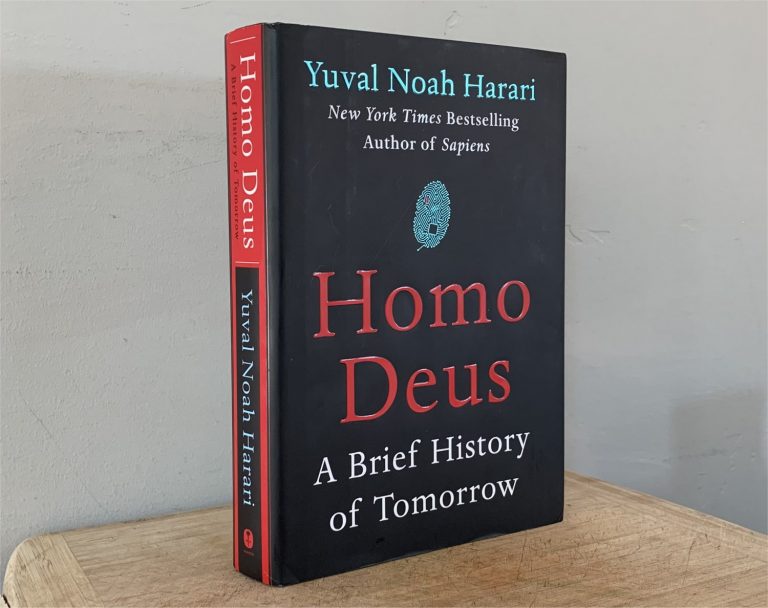 Harari, Yuval Noah. 2017. Homo Deus: A Brief History of Tomorrow. Harper. *****
Harari, Yuval Noah. 2017. Homo Deus: A Brief History of Tomorrow. Harper. *****
In effect a sequel to Sapiens. Harari reflects on three problems of human history, famine, plague, and war, and considers what happens next, proposing immortality, happiness, and divinity, and how the ideal of humanism, which as a religion (again, I find his simplistic use of some terms problematic) is flawed. Modern history is a deal between science and humanism, but it can’t go on forever, because of resources, or a collapsing ecology. While there is no serious alternative to the liberal package of individualism, human rights, democracy, and the free market, some of its presumptions may not be true, e.g. free will. Three ways liberalism might be made obsolete include humans being replaced by robots and thus becoming unemployed, with useless people spending their lives taking pharmaceuticals and playing computer or VR games. What we should be paying attention to: in the short term, immigration and refugees. Over the decades: global warming, and inequality. In the long term: considering to what extent organisms are algorithms and whether intelligence is decoupling from consciousness. As with the first book, this is a fascinating, provocative big picture book taking fresh looks and new perspectives on many familiar ideas. (post)
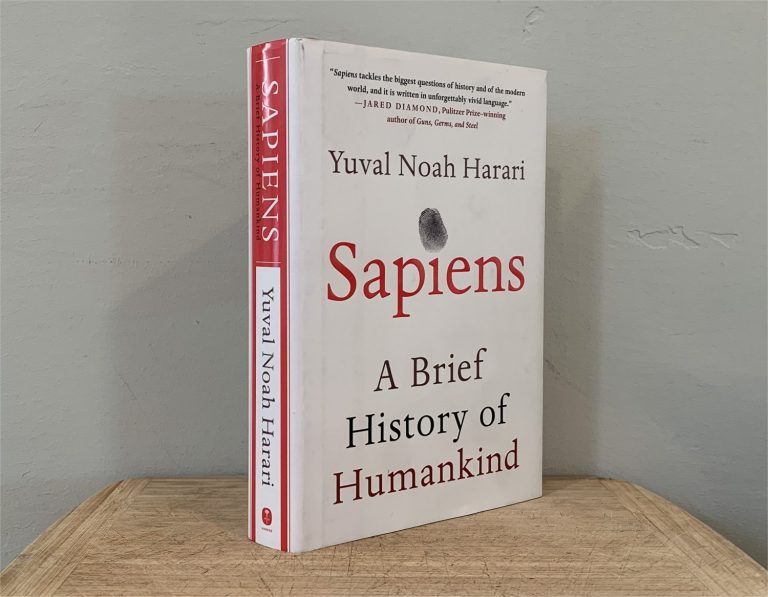 Harari, Yuval Noah. 2015. Sapiens: A Brief History of Humankind. Harper. *****
Harari, Yuval Noah. 2015. Sapiens: A Brief History of Humankind. Harper. *****
This is a history of humanity, with focus on the concepts that have allowed our species to grow and occupy the planet; it’s a history of ideas, not of names and dates. The ideas include the cognitive revolution, 70,000 years ago; the agricultural revolution, 12,000 years ago; and the scientific revolution, 500 years ago. Harari is fond of trios, and his perspectives challenges conventional wisdom; e.g. he considers religion, nationalism, and laws as examples of common myths, or ‘imagined realities’, that have enabled human society to grow, though these ideas have no physical basis in the real world. Another trio: money, empire, and religion. I find his takes problematic at times, e.g. considering humanist philosophies (secular humanism, et. al.) simply other kinds of ‘religions’ that worship humanity and not gods. Most striking is his conclusion is that humanity as we know it is about to end. (post)
 Kahneman, Daniel. 2011. Thinking, Fast and Slow. Farrar, Straus and Giroux. *****
Kahneman, Daniel. 2011. Thinking, Fast and Slow. Farrar, Straus and Giroux. *****
Perhaps the most influential book of the past couple decades on the subject of human mental biases, how the ways in which we think entail errors of perception, and employ heuristics that are often but not always true. It’s a summary of the author’s own work (along with Amos Tversky), for which he won a Nobel Prize. The essential model is that our brain operates at two levels — System 1 is automatic, quick, and involuntary; System 2 requires efforful mental attention. Most of what we think and do originates in the first; when things get difficult the second takes over, and normally has the last word. A long, detailed book that looks at how these systems underlie our biases and illusions, how we make choices, and how we think about life. (post)
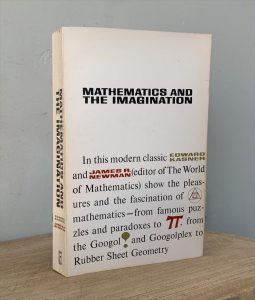 Kasner, Edward, & Newman, James. 1967. Mathematics and the Imagination. Fireside/Simon & Schuster. *****
Kasner, Edward, & Newman, James. 1967. Mathematics and the Imagination. Fireside/Simon & Schuster. *****
An introduction to mathematical themes for the lay reader, including infinities, topologies, non-Euclidean geometries, chance and probablities, transcendental numbers. Also fun topics like puzzles and paradoxes, which can be understood with mathematical insight. Concludes by pondering the philosophical question of whether math is discovered, or invented, by humans; they come down on the latter, with non-Euclidean geometries as an example. But the book was published 80 years ago, and things may have changed. (Originally published 1940.) (post) (Read Reread Sep 2022)
 Pinker, Steven. 2018. Enlightenment Now: The Case for Reason, Science, Humanism, and Progress. Viking. *****
Pinker, Steven. 2018. Enlightenment Now: The Case for Reason, Science, Humanism, and Progress. Viking. *****
Notes forthcoming
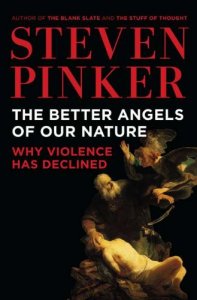 Pinker, Steven. 2011. The Better Angels of Our Nature. Viking. *****
Pinker, Steven. 2011. The Better Angels of Our Nature. Viking. *****
An expansive book that, in detailing how violence has greatly declined over millennia and especially in recent centuries and decades, tells the history of the human race. The book covers big trends of history (transition to agriculture, the age of reason and the enlightenment, etc.), our five inner demons (violence, dominance, revenge, sadism, ideology), our four better angels (empathy, self-control, moral sense, and reason), and five historical forces (Leviathan; commerce; feminization; cosmopolitanism; and the escalator of reason) that have brought about the modern world. (thesis and outline; summary of chapter 1; summary of chapters 2 and 3; some quotes)
 Pinker, Steven. 2002. The Blank Slate: The Modern Denial of Human Nature. Viking. *****
Pinker, Steven. 2002. The Blank Slate: The Modern Denial of Human Nature. Viking. *****
Another big Pinker book summarizing and extending themes considered in his own earlier books and in books by Minsky, Wilson, Sagan/Druyan, Haidt, and Greene. The book actually addresses not one but three misapprehensions about the human mind: that it’s a “blank slate,” that there is such a thing as a “noble savage,” and that there is a “ghost in the machine,” i.e. a noncorporeal force, like a homunculus or a soul, riding in our brain and making our decisions for us. The first notion, with its implication that human nature is a product of education and environment, does not even bear close examination. Our instincts, and our ability to learn, indicate something already present in the mind (rather like firmware or the operating system in a computer) at birth. This understanding has replaced earlier ideas of associationalism and behaviorism of 20th century psychology, just as cognitive neuroscience and evolutionary psychology have undermined notions of the savage and the ghost. By page 101 Pinker closes his case that the mind is not a blank slate; the remainder of the book explains why the idea is resisted (fears of inequality, nihilism), and explores aspects of human nature: how we perceive reality, how our intuitions go wrong, why we suffer, our moral sensibilities. With special attention to politics, violence, gender, children, and the arts. Running themes include how these ideas challenge both liberal and conservative presumptions, and how the expansion of experience and knowledge over human history necessarily requires a transition from a monocultural morality to a multicultural one. Another vast book by Pinker that provides insight to virtually everything. The link here is to the 10th post summarizing the book, with links to the earlier nine. (post) (Read May 2024)
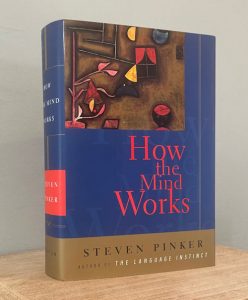 Pinker, Steven. 1997. How the Mind Works. Norton. *****
Pinker, Steven. 1997. How the Mind Works. Norton. *****
Pinker’s second big book after THE LANGUAGE INSTINCT (1994), this one covers many additional topics about the mind. The first part covers evolution and natural selection, and how the mind interprets and understands reality. The second half covers what’s come to be called evolutionary psychology, how interactions between people with minds provides insight into aspects of human cultures. (This part resembles Wilson’s earlier CONSILIENCE.) Key theme: “The mind is a system of organs of computation, designed by natural selection to solve the kinds of problems are ancestors faced in their foraging way of life, in particular, understanding and outmaneuvering objects, animals, plants, and other people.” The mind is what the brain does. Its complex design is genetic. Nature vs nurture is so simplistic as to be not even wrong. Behaviors we think evolutionarily maladaptive (like homosexuality or celibacy) don’t need to be “explained”; they are expressions of minds that formed in our ancestral environment; humans didn’t evolve to spread their genes, they evolved to enjoy behaviors that spread genes. Old notions of souls or force fields have given way to the Computational Theory of the Mind. Evidence for natural selection is overwhelming, despite people desperately wanting it to be wrong. Humans rule over the other animals due to our big brains. There are chapters about how vision works, human reasoning, emotions (common across all cultures), family values (the evolutionary logic of relationships between parents and children, brothers and sisters, men and women, etc.), and a final chapter about “The Meaning of Life,” covering the arts, humor, religion, free will, morality. Perhaps our evolved cognitive equipment, suitable for unconscious survival, is insufficient to understand deep issues. A book both vast and deep, like Wilson’s, it summarizes the modern scientific understandings of almost everything. (Post 1; Post 2; Post 3; Post 4; with a final Post 5 compiling several long quotes from the book.) (Read Feb 2024)
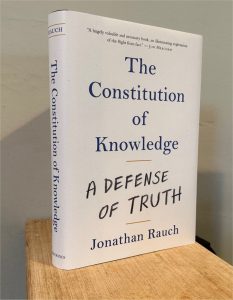 Rauch, Jonathan. 2021. The Constitution of Knowledge: A Defense of Truth. Brookings Institition. *****
Rauch, Jonathan. 2021. The Constitution of Knowledge: A Defense of Truth. Brookings Institition. *****
Rauch reacts against the epistemic crisis formed by disinformation and conservative politics that has resulted in the public’s incapacity to tell truth from lie. The solution is to defend the set of rules and norms that have arisen over the past century to create our functioning society. This “constitution” has two essential principles: “no final say” and “no personal authority.” Adhering to these rules creates “a community of error-seeking inquirers accountable to each other but never to any particular authority, and knowledge will arise from their hive-like, largely self-organizing activities” — quite analagous to science. Rauch reviews why reason arose at all, given our psychogical biases, and how those biases were reigned in by the Industrial Revolution, and American revolution, and finally the scientific revolution, which introduced methods for making errors and finding them quickly. More formally, he characterizes the “reality-based community” as guided by a fallibist rule, and an empirical rule, that have become inherent in the “mainstream media” in contrast to the “yellow journalism” of the 19th century and now Fox News. The balance of the book recounts the history of how this “constitution” came about. Summary: “the Constitution of Knowledge is the most successful social design in human history, but also the most counter-intuitive. In exchange for knowledge, freedom, and peace, it asks us to mistrust our senses and our tribes, question our sacred beliefs, and relinquish the comforts of certitude. It insists that we embrace our fallibility, subject ourselves to criticism, tolerate the reprehensible, and outsource reality to a global network of strangers.” (Post 1; Post 2; plus this post showing pages of the book that detail how this reality-based community works, which happens to correspond the “deep state” conservatives unthinkingly want to dismantle.
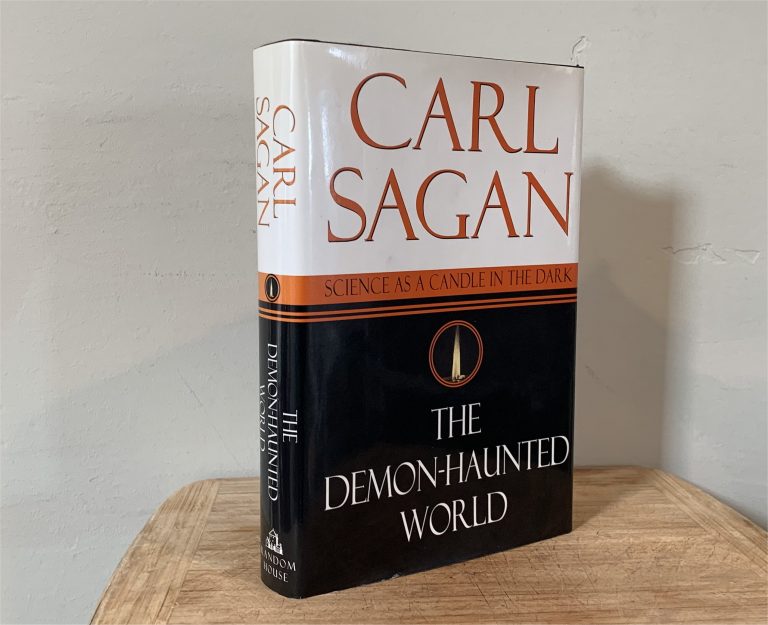 Sagan, Carl. 1996. The Demon-Haunted World: Science as a Candle in the Dark. Random House. *****
Sagan, Carl. 1996. The Demon-Haunted World: Science as a Candle in the Dark. Random House. *****
Sagan takes on pseudo-science by showing how science is the methodology for determining what’s real and what’s bunk, discussing psychological reasons for why people are attracted to pseudo-science (and religion) and put off by real science, and the ways the ideals of science and democracy align. Memorable chapters concern Sagan’s “fine art of baloney detection” (e.g. reproduced here), his “dragon in my garage” metaphor about supernatural claims that lack all evidence, and a strong discussion of the methods of values of science. A running theme: science is a balancing act between being open to wonder, and being skeptical when drawing conclusions; followers of pseudoscience are open to wonder but lack all skepticism. The book is a tad dated in its focus on pseudo-scientific issues of the ’90s, e.g. UFOs and alien abductions, but its principles remain today as relevant as ever. (post)
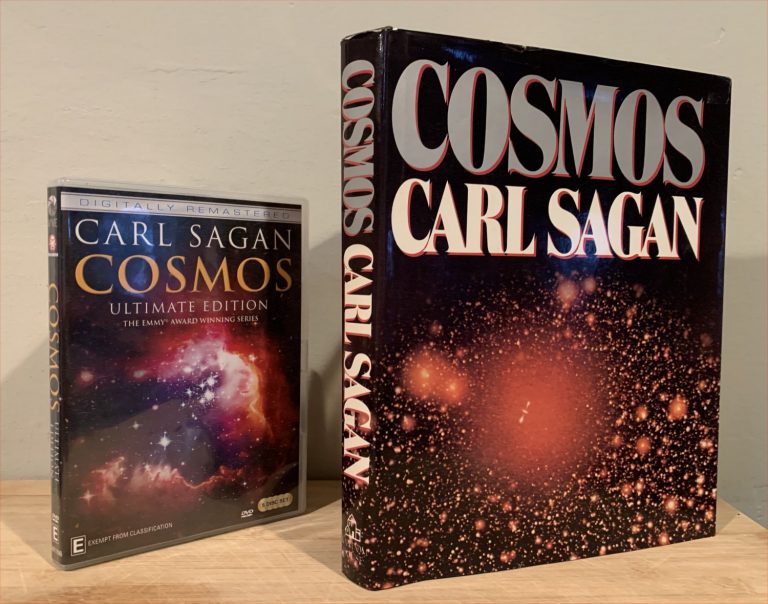 Sagan, Carl. 1980. Cosmos. Random House. *****
Sagan, Carl. 1980. Cosmos. Random House. *****
Sagan’s famous book companion to his 1980 13-part TV series was the best-selling science book of all time, at its time. It’s about what we know about the cosmos — from the planets, to the stars, to the galaxies, to speculations of other intelligences — with explanations of *how* we know these things, many envisioned in historical re-enactments. And concerns about the future of our planet, given environmental threats apparent even back in 1980. (post)
 Shermer, Michael. 2015. The Moral Arc: How Science and Reason Lead Humanity Toward Truth, Justice, and Freedom. Henry Holt. *****
Shermer, Michael. 2015. The Moral Arc: How Science and Reason Lead Humanity Toward Truth, Justice, and Freedom. Henry Holt. *****
Shermer’s magnus opus, perhaps, spiritual kin to Pinker’s THE BETTER ANGELS OF OUR NATURE and keying off the famous statement by Martin Luther King about the arc of the moral universe. The thesis is that morality has improved over time, through science and reason: better understanding of the real world that has helped us avoid factual errors that generated behaviors our ancestors and their religions took for granted, but which we increasingly regard as immoral. It is not true that science can say nothing about religion, or that morality depends on religion. Key principles include the “principles of interchangeable perspectives” and the virtue of continuous, rather than black and white, thinking. This understanding of the world began with the scientific revolution (Copernicus to Newton) and the Age of Reason and the Enlightenement (Newton to the French Revolution). Religion is not a source of morality or moral progress; when such progress is made, the churches resist it. Religions are tribal and xenophobic by nature. Shermer offers his own Decalogue (which I’ve included on this page) and critiques the traditional set of ten commandments. Shermer has detailed case studies of how morality has improved regarding slaves, women, gays, and animals. And finally he covers issues of moral regress and evil, free will and moral culpability, competing notions of moral justice, and the future of moral progress. Long summary with quotes at the link. (post)
 Wilson, Edward O.. 2014. The Meaning of Human Existence. Liveright. *****
Wilson, Edward O.. 2014. The Meaning of Human Existence. Liveright. *****
A concise summary of the great scientist’s views on the big issues of science and philosophy, summarizing themes from the author’s many other books. Meaning is not about intent and design; humanity’s meaning is a summation of the accidents of history that have brought about our existence. This leads directly to questions of to what extent we direct our own future evolution. He reviews the key concept of group selection, and the inherent conflict with individual selection: “risking oversimplification, individual selection promoted sin, while group selection promoted virtue”, thus the eternal struggle within every person. He revisits the idea of ‘consilience’ between the sciences and humanities; the Enlightenment; the two cultures; how our devotion to stories reflects how the mind works. How the humanities explore the comfort zone of human existence, while science explores continua the humanities cannot perceive (but which some other animals do). Science will mature and stabilize; aliens would know the science and be interested instead in our humanities. He discusses super-organisms; speculates on the nature of intelligent extra-terrestrials, and why aliens could never invade our planet (or we theirs); reviews the collapse of biodiversity; and then reflects about human nature, about instinct, religion (built in to human experience; “regarded by the common people as true, by the wise as false, and by rulers as useful”; motivating the tribalism behind conflicts in the world), and free will (which he suppose exists at least for practical reasons). What is the meaning of human existence? It’s the epic of our species through evolution, prehistory, recorded history, and the potential for what we choose to become. With some final swipes at creationism (“a triumph of blind religious faith over carefully tested fact”), Wilson concludes “If the heuristic and analytic power of science can be joined with the introspective creativity of the humanities, human existence will rise to an infinitely more productive and interesting meaning.” Detailed notes part 1, part 2, part 3, part 4, part 5.
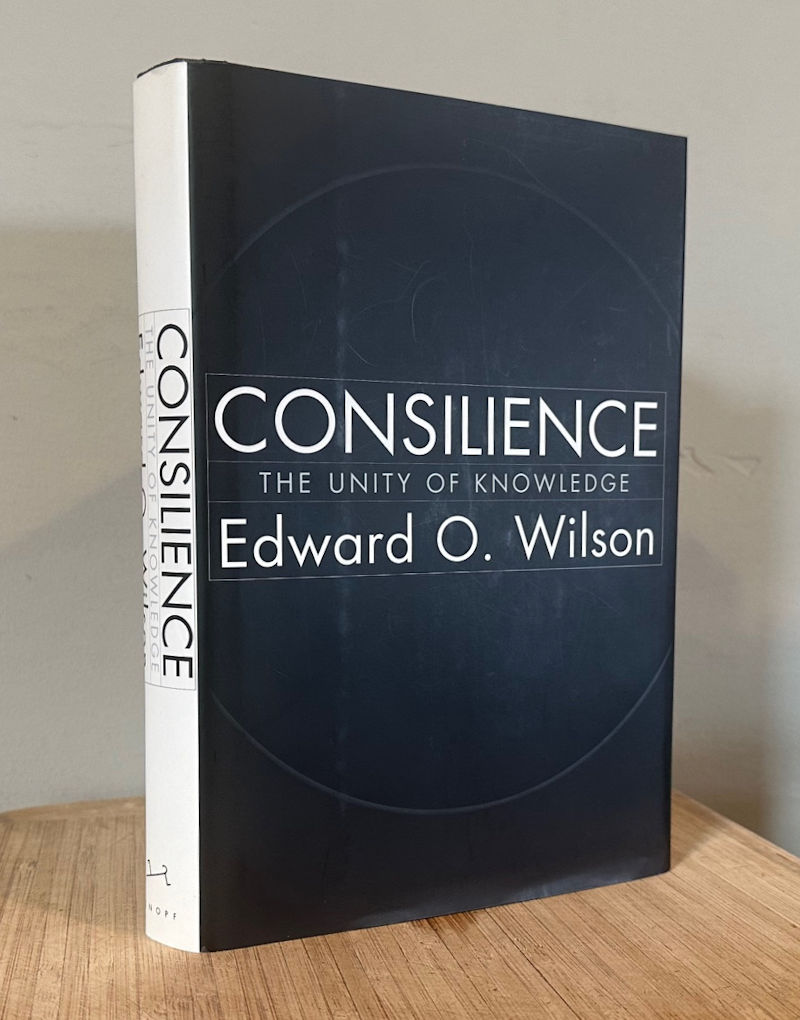 Wilson, Edward O.. 1998. Consilience: The Unity of Knowledge. Knopf. *****
Wilson, Edward O.. 1998. Consilience: The Unity of Knowledge. Knopf. *****
Likely Wilson’s magnus opus, this is his attempt to describe a worldview that unifies all knowledge, especially between the sciences and the humanities, leaving religion behind (as he did as a boy) and applying scientific principles and insights even to areas where this viewpoint is resented. He addresses the great branches of knowledge, and reflects how the Enlightenment was constrained by the deism of its leaders. How science works: “the most effective way of learning about the real world ever conceived.” How philosophy has been hobbled by “ignorance of how the brain works”. How science is challenged by the complexity of systems, with ideas of emergence avoiding the perils of reductionism. His chapter 6 on the mind corresponds to Pinker’s entire book on the subject: the mind is the brain, it evolved for survival and not perception of the real world, and so on. He describes how culture emerges from human nature, and how human nature entails regularities like kin selection and altruism. Then, as Pinker does later, applies these understanding to particular aspects of human culture, especially in the social sciences: the arts and their interpretation, ethics and religion. Finally he asks, To what end? What is humanity’s future? The key questions are: what we are, where do we come from, and how shall we decide where to go. Neither theology nor philosophy has answered these. Our challenges include our potentia





